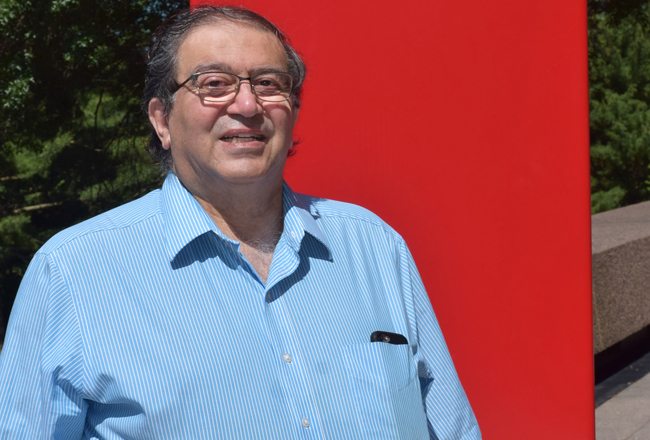Suite Talk: Richard Guha, entrepreneur-in-residence at Sacred Heart University
 Richard Guha has seen a great deal over his five-decade career as a corporate executive in the consumer products, telecommunications, energy and software industries. But perhaps his most unusual work occurred this spring in his role as entrepreneur-in-residence at Sacred Heart University, where the COVID-19 pandemic forced his consulting to abruptly shift from the immediacy of person-to-person discussions to the digital confines of the Zoom screen.
Richard Guha has seen a great deal over his five-decade career as a corporate executive in the consumer products, telecommunications, energy and software industries. But perhaps his most unusual work occurred this spring in his role as entrepreneur-in-residence at Sacred Heart University, where the COVID-19 pandemic forced his consulting to abruptly shift from the immediacy of person-to-person discussions to the digital confines of the Zoom screen.
In this edition of Suite Talk, Business Journal Senior Enterprise Editor Phil Hall discussed Guha”™s role in adapting to business mentoring in the midst of a pandemic.
You are the university”™s entrepreneur-in-residence, but nobody was in residence at the school for the past semester. How were you able to do your duties?
“Well, it”™s been all virtual. It”™s not quite the way we envisaged it because the idea was that I would sort of run into people at events and such. What”™s happened is the professors have to refer people ”” and, of course, the professors have had their own challenges, so they”™ve had to have virtual meetings with students.”
How have the student entrepreneurs that you are advising responded to the crisis? Have they looked at the pandemic with any entrepreneurial thoughts?
“For everyone who says, ”˜Oh, my God, because of COVID-19 the business idea I had isn”™t going to work,”™ there”™s another one who says, ”˜There”™s an opportunity here. I can do stuff, whether it”™s to do with home-delivery services or whether it”™s to do with purification using ultraviolet light.”™ I think for some people it has sparked ideas.”
What type of pandemic-inspired businesses mostly have the students here been interested in creating?
“Some of them are fairly straightforward: sort of delivery service-type things, but some of them get fairly technical using blockchain to track organic foods through markets. The most recent one we had was the funding of agricultural businesses because with the restrictions on importation of food there”™s an opportunity for local farmers and local producers to do stuff. So how do you do that, because the banks don”™t always understand it?”
And before the pandemic disrupted the country, what businesses were the students focused on created?
“A lot of them have been around fintech and there have been a few technology ones. But we don”™t cover every technology ”” we don”™t have chemical engineering courses or anything like that here.”
What are your plans for the fall semester?
“It depends if we come back or not. But I think if we come back in any physical sense whatsoever, we”™ll be able to meet. If we don”™t, I think we”™re going to get better at being able to do things online. I mean, actually, I”™m not terrible ”” I was quite worried at first, but I think it”™s working out surprisingly well.”
Do you find that today”™s students, the Generation Z, being more entrepreneurial than the millennials or the Gen Xers that came before them?
“If you look at the statistics, students have always been comparably entrepreneurial. I think the difference is that now we give them help. And I remember when I was an undergraduate many years ago ”” I won”™t even tell you how many years ago ”” I started two businesses and they failed miserably because I wasn”™t terribly good at it. We had no advisers, no help and we were on our own. Now, you can get help from the university and from the community around you. I would say that the difference isn”™t so much they don”™t have ideas, but the difference is they can do it.”
Are you concerned that a lot of the students would be graduating from the university and leaving Connecticut? After all, there has been an exodus of people out of the state and the state hasn”™t been very good at attracting new businesses to come in.
“Interesting enough, the state has probably had more programs to help startups than any other state in the country. Connecticut Innovations, the state”™s venture capital arm, started in 1989, and not every state has an entity like that ”” several do, but they”™re typically 10 years old. It also has CTNext.
But even if I leave and go to New York, guess what? I tell my friends to go to Sacred Heart, so there”™s always the chance of picking people up on the rebound as long as people say, ”˜Oh, Connecticut”™s a good place to be.”™ A lot of people leave, but people come here and that”™s really the critical thing.”